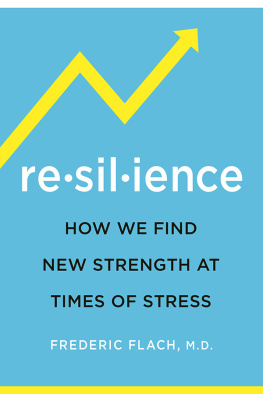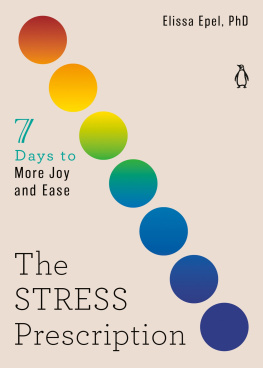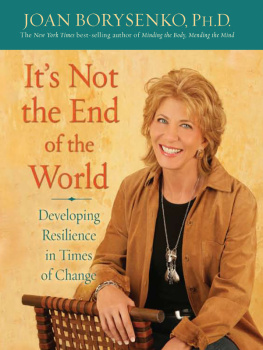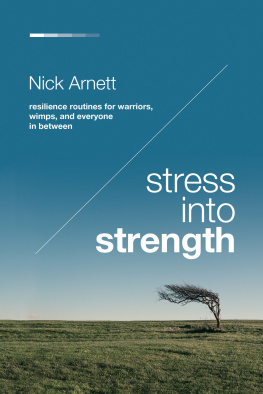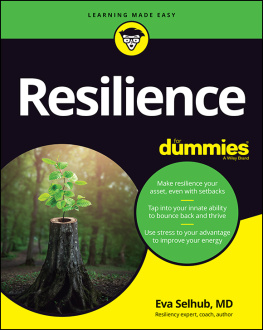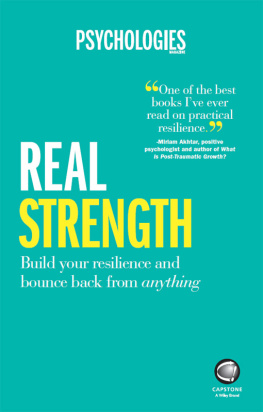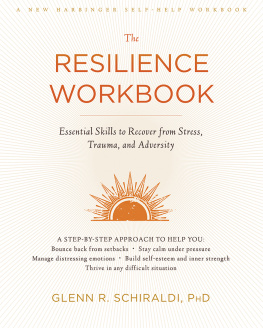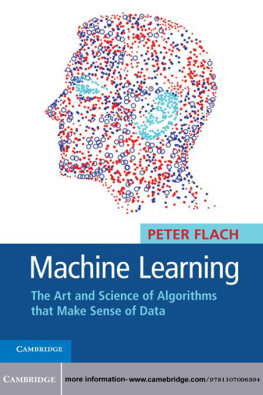Frederic Flach - Resilience: How We Find New Strength At Times of Stress
Here you can read online Frederic Flach - Resilience: How We Find New Strength At Times of Stress full text of the book (entire story) in english for free. Download pdf and epub, get meaning, cover and reviews about this ebook. year: 2020, publisher: Hatherleigh Press, genre: Home and family. Description of the work, (preface) as well as reviews are available. Best literature library LitArk.com created for fans of good reading and offers a wide selection of genres:
Romance novel
Science fiction
Adventure
Detective
Science
History
Home and family
Prose
Art
Politics
Computer
Non-fiction
Religion
Business
Children
Humor
Choose a favorite category and find really read worthwhile books. Enjoy immersion in the world of imagination, feel the emotions of the characters or learn something new for yourself, make an fascinating discovery.
- Book:Resilience: How We Find New Strength At Times of Stress
- Author:
- Publisher:Hatherleigh Press
- Genre:
- Year:2020
- Rating:3 / 5
- Favourites:Add to favourites
- Your mark:
- 60
- 1
- 2
- 3
- 4
- 5
Resilience: How We Find New Strength At Times of Stress: summary, description and annotation
We offer to read an annotation, description, summary or preface (depends on what the author of the book "Resilience: How We Find New Strength At Times of Stress" wrote himself). If you haven't found the necessary information about the book — write in the comments, we will try to find it.
Resilience: How We Find New Strength At Times of Stress — read online for free the complete book (whole text) full work
Below is the text of the book, divided by pages. System saving the place of the last page read, allows you to conveniently read the book "Resilience: How We Find New Strength At Times of Stress" online for free, without having to search again every time where you left off. Put a bookmark, and you can go to the page where you finished reading at any time.
Font size:
Interval:
Bookmark:


NEW STRENGTH AT
TIMES OF STRESS
RESILIENCE
Frederic Flach, tried to pinpoint the attitudes and attributes that resilient people have in commonthe psychological sources of the bounce-back factor... which [he] believes most of us can cultivate.
Robert Rodale, Prevention Magazine
Part practical and part inspirational.... Written with clarity... contains short, readable examples for all aspects of life... useful to lay persons in times of crisis.
The New England Journal of Medicine
Why are some of us permanently damaged by personal setbacks or traumatic change while others pull themselves together and plow on, better prepared for future crises? The answer, says Flach in this guide to handling the endemic stresses of modern life, is resilience....[A] coherent theory, presented here with considerable skill.
Kirkus Reviews
Frederic Flachs most important book to date. Here he brings together his preeminent understanding of psychotherapy and psychiatry drawn from thirty years of practice.... The result is a very helpful and insightful book with numerous case examples.... A humane and optimistic treatise recommended to all those who have interest in understanding their personal journey and their destiny.
Peter C. Whybrow, M.D., Director of the Neuropsychiatric Institute and Executive Chair of the Department of Psychiatry and Biobehavioral Sciences at UCLA
Well-written and vital ways of coping with stress, recovering from disruption, and creating a process by which one can not only survive catastrophe but can escape with flexibility, faith, and the will to survive.
Stanley Krippner, Ph.D., Professor of Psychology at Saybrook Graduate School, San Francisco
[Resilience] is the greatest teachers guide Ive seen for helping all teachers transform their classrooms into resilient learning environments in which young people, especially those under stress, can discover the path from insecurityto learningto creativity.
Archie E. Lapoint, Former Executive Director of the National Assessment of Educational Progress
Hatherleigh Press is committed to preserving and protecting the natural resources of the earth. Environmentally responsible and sustainable practices are embraced within the companys mission statement.
Visit us at www.hatherleighpress.com and register online for free offers, discounts, special events, and more.
RESILIENCE
Copyright 1997, 2004, 2020
Originally published by Ballantine Books.
All rights reserved. No part of this book may be reproduced in any form or by any means, electronic or mechanical, including photocopying, recording, or by any information storage and retrieval system, without permission in writing from the publisher.
DISCLAIMER
This book does not give legal or medical advice. Always consult your doctor, lawyer, and other professionals. The names of people who contributed anecdotal material have been changed.
Names of medications are typically followed by or symbols, but these symbols are not stated in this book.
The ideas and suggestions contained in this book are not intended as a substitute for consulting with a physician. All matters regarding your health require medical supervision.
Library of Congress Cataloging-in-Publication Data is available.
ISBN: 978-1-57826-901-3
Visit us at www.hatherleighpress.com and register online for free offers, discounts, special events, and more.
Cover design by Carolyn Kasper
Printed in the United States
10 9 8 7 6 5 4 3 2 1
To the late Gerard Murphy, S.J.,
who, when asked to recommend
me for medical school, told me he
felt my gifts went beyond those
required of a physician, but, if I persisted
in my wish to become a doctor,
I should surely become a psychiatrist.
I read Dr. Frederic Flachs Resilience for the first time while working on the original manuscript as an editorial assistant at Ballantine Books more than 30 years ago. I had recently graduated from Vassar College and moved to New York City to start my career when, six weeks after graduation, my father died suddenly of a heart attack. As I went through the painful, disruptive process of mourning my father, I found the principles of Resilience extremely helpful. And in the years since, as Ive faced myriad challenges, including career changes and family health issues, I have turned to the philosophy inherent in Resilience many times.
First published in 1988, the process outlined by Dr. Flach in his booka cycle of stress, adversity, disruption, and renewalis deeply meaningful still today. Dr. Flach defines resilience as the psychological and biological strengths required to successfully master change. He understood that a cycle of falling apart and subsequently putting the pieces of ourselves and our lives together again in a new form is a central and recurring theme throughout the human life cycle.
Yet Dr. Flachs message is a hopeful one. Becoming more resilient is something that is ever within our grasp through our ability to nurture certain resilient personality traits within ourselves. Among them are: Creativity. The ability to tolerate pain. Insight into ourselves and what we are going through at any particular phase in our lives. Independence of spirit. Self-respect. The ability to restore self-esteem when it is diminished or temporarily lost. A capacity for learning. The ability to make and keep friends. Freedom to depend on others, with the skill to set proper limits on the depth of our dependency. A perspective on life that offers a vital, evolving philosophy within which we can interpret all that we experience and from which we can discover some measure of personal meaning.
At time of writing, we as a society are living through a period of profound disruption in our collective lives, brought on by COVID-19, the new coronavirus. Even long after the quarantine has lifted, we will still be sorting through the pandemics impact on how we do everything: how we educate our children, care for our elderly, structure our work and home lives, and even how we come together for entertainment, sports, religion and holidays. As we struggle to forge a new normal, now is the perfect moment to read Resilience.
Now, as I look forward to the months and years ahead, post-pandemic, I find myself turning once again to Dr. Flachs words for encouragement and guidance: The most encouraging observation Ive made over all these years is that resilience is a strength most of us can develop with thought and practice.
Mary Kathleen Flynn
Editor-in-Chief, Mergers & Acquisitions
T he word disruption is typically perceived as a negative. Most would say they dont want disruptions in their plans, their relationships, their lives. Disruption implies inconvenience at the least and tragedy at worst; so, naturally, we make every attempt to avoid it.
Yet in some ways, disruption can be positive. The invention of the personal computer, for example: that was a disruption, especially to typewriter manufacturers. The introduction of cellular phones was a disruption. The innovation of the internet wasand continues to bea disruption. Every new technological development that changes things, that moves us away from how things have been done in the past, is a disruption.
Font size:
Interval:
Bookmark:
Similar books «Resilience: How We Find New Strength At Times of Stress»
Look at similar books to Resilience: How We Find New Strength At Times of Stress. We have selected literature similar in name and meaning in the hope of providing readers with more options to find new, interesting, not yet read works.
Discussion, reviews of the book Resilience: How We Find New Strength At Times of Stress and just readers' own opinions. Leave your comments, write what you think about the work, its meaning or the main characters. Specify what exactly you liked and what you didn't like, and why you think so.

